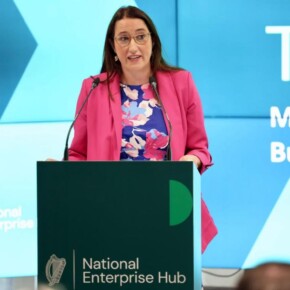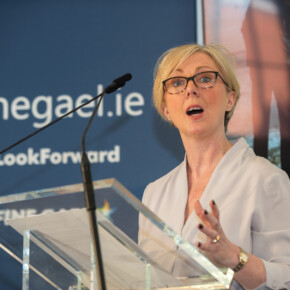Report of the Future of Media Commission released
Padraig Conlon 12 Jul 2022
The Taoiseach, Micheál Martin, Tánaiste Leo Varadkar and Minister for Tourism, Culture, Arts, Gaeltacht, Sport and Media, Catherine Martin today welcomed the publication of the report of the Future of Media Commission and announced a major Government initiative to support Ireland’s media sector.
The Future of Media Commission, established by Government in September 2020, was tasked with developing recommendations on sustainable public funding and other supports to ensure media in Ireland remains viable, independent and capable of delivering public service aims.
The Commission was also asked to make specific recommendations in relation to RTÉ’s financing.

Professor Brian MacCraith, Chair of the Future of Media Commission, pictured with Minister Catherine Martin, Tanaiste Leo Varadkar and Taoiseach Micheal Martin at the launch of the Report of the Future of Media Commission in Dublin Castle today.
Speaking following the Government meeting earlier today, Taoiseach Micheál Martin said:
“I’d like to thank Professor Brian MacCraith and each of the Future of Media Commission members for their dedication and commitment in producing this report.
“The Commission has established that high-quality, independent journalism and a pluralistic media is vital to a healthy democracy and social cohesion.
“Today’s Government decision to overhaul the TV licence and to target additional investment into media in Ireland marks a new departure, both for public service broadcasters and for commercial and community print, online and broadcast media.
“The Government is determined to do everything we can to ensure that Ireland’s media continues to deliver high quality public service content at local, regional and national levels.
“The Future of Media Commission has charted a clear way forward, and the Government has now agreed in principle to adopt and implement the vast majority of the Commission’s recommendations.”
Welcoming the publication of the report, Tánaiste Leo Varadkar commented:
“This important report will help to secure the future of public service broadcasting in Ireland.
“The decision to maintain but overhaul the licence fee is the correct one.
“It guarantees a dedicated and more secure funding stream for public service broadcasting and ensures that funding for the public service is ring-fenced.
“One of the most important measures is the new Media Fund which will promote coverage of cultural issues, news items, at national but also local level, on traditional and also online platforms.
“And one of the most important measures is the promotion of more diversity in broadcasting at all levels, in front of the camera and behind the scenes.
“A bedrock of our democracy, public service broadcasting has a remit to ensure that no one voice should dominate the debate, and that a plurality of views is always represented. It strives – and often achieves – high standards of independence and balance. I believe this report will help to ensure that it has a future.”

Professor Brian MacCraith, Chair of the Future of Media Commission, pictured with Taoiseach Micheal Martin, Tanaiste Leo Varadkar Minister Catherine Martin at the launch of the Report of the Future of Media Commission in Dublin Castle today
Commenting on the importance of Commission’s work, Minister for Tourism, Culture, Arts, Gaeltacht, Sport and Media, Catherin Martin TD, said:
“The key aim of the Commission was to examine how media should serve Irish society, how well the current system meets these goals and what changes ought to be made to improve media in Ireland in the future.
“The Commission have done an excellent job in carrying out this task and their report provides Government with a solid basis on which we can now ensure that a sustainable framework is put in place for the next decade at least.”
The Commission’s report contains a total of 50 recommendations, which in effect constitute a strategic agenda for transforming Ireland’s media sector.
Today’s announcement by Government adopts in principle 49 of the 50 recommendations, and proposes an alternative approach to the Commission’s recommendation on a new funding model.
Key among the report’s recommendations is reforming and enhancing the TV licence – a system that currently is out of step with changing trends in media consumption and which does not realise the full funding needs of the sector.
The Government has decided that in order to maintain a direct link between media and the public they serve, and to minimise the risk of actual or perceived political interference in media independence, that the TV licence will be maintained but overhauled.
Work will commence immediately on setting out the legislative and administrative changes required to ensure the TV licence system is more equitable, relevant and sustainable.
The reform of the TV licence will aim to align with changing viewing habits, tackle evasion, streamline the collection and payment regime, and thereby provide a more sustainable level of funding for the sector.
The new funding arrangements will be accompanied by increased transparency, accountability and oversight, with an expanded role for Coimisiún na Meán and NewERA.
A new Media Fund will be established to support the wider media and journalism sector at local, regional and national levels, and will be open to broadcast, print and online media.
The Fund will allow for the provision of supports on a platform-neutral basis, and enable the targeting of supports for particular content, such as culture or news, or areas of particular need, for example at community or local level.
The schemes recommended include Local Democracy Reporting, News Reporting, Courts Reporting, and Community Media.
In addition, it is intended to provide support for media access and training, and for digital transformation.
These new schemes will be in addition to the existing Sound and Vision and Archiving schemes.
The report also recommends a number of other significant actions to help ensure greater equality, diversity, inclusion, and sustainability in the media sector.
Coimisiún na Meán, the new regulator, will have a key role in setting industry standards, and eligibility for public funding will be conditional on adherence to these standards.
Similarly, the Commission recommends that environmental sustainability standards could be considered as part of future funding eligibility criteria.
Commenting on Government’s plans to implement the report’s recommendations, Minister for Tourism, Culture, Arts, Gaeltacht, Sport and Media, Catherin Martin TD, said:
“Bringing forward the Online Safety and Media Regulation Bill, and in particular the establishment of the new media regulator, Coimisiún na Meán, has been a key element in Government’s overall approach in this area.
“An Coimisiún will provide the regulatory and developmental framework to implement the report of the Future of Media Commission, in particular the appointment of a Broadcasting Commissioner and a Media Development Commissioner.
“Some of the key recommendations within the report, which Government is committed to putting in place, are to provide increased supports to the wider media sector – at local, regional and national levels.
“From dedicated community media supports to supporting reporting on matters of local interest such as Courts and local authorities, to improving diversity within and access to the sector, what we are now embarking on is a real transformation of public funding support to the whole media sector.
“I believe that assisting media at all levels is vital.
“As recommended in the Report, we are also committing to reviewing the provision of Irish languages services, and to examine the opportunities to improve, enhance and increase Irish language broadcasting in particular. We will also work to ensure that the increased investment we are committed to will provide greater opportunities for the entire independent production sector, and the wider creative sector.”
In welcoming the publication of the report, Chair of the Commission Professor Brian MacCraith said:
“The Future of Media Commission has produced a comprehensive assessment of Ireland’s media system, the challenges it faces and the opportunities that lie ahead.
“In particular, the Commission has made fifty recommendations that collectively chart the way to a sustainable and resilient future for the sector in delivering public service aims over the next decade.
“I am very pleased that Government has agreed to accept and implement almost all the Commission’s recommendations. In particular, I welcome the Government’s recognition of the societal value of public service content, and its commitment to support public, commercial and community media organisations at local, regional and national level.
“The long-term impact of this report and its recommendations will, of course, depend largely on the scale of public funding of the media sector.
“While the model of public funding proposed by the Commission is not the one being adopted by Government, it is of fundamental importance that any alternative model deliver a similar level of funding support.
“I want to pay tribute to the members of the Commission, whose expertise and dedication have resulted in a comprehensive report of long-term significance.”











